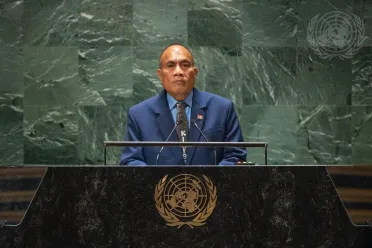Statement
Statement summary
TANETI MAAMAU, President of Kiribati, said geopolitical tensions, economic disparities and the unforeseen challenges brought about by events like pandemics, climate-related crisis and disasters have tested the resolve of national Governments. Therefore, it is crucial to re-establish faith in multilateral cooperation and diplomacy, and renew commitment to accountability, good governance and responsive policies. The idea of global solidarity underscores the principle that “no nation can thrive in isolation” and recognizes the uniqueness of each country’s context and need, he said, noting that the experience from the pandemic is exemplary of “the world coming together as one family”. While he recognized the importance of science to address pandemics, international cooperation is essential for gaining a better understanding of the variants and vaccines before they are rolled out.
Turning to sustainable development, he pointed to Kiribati’s first-ever long-term development plan to transform the country into a wealthier, healthier and peaceful nation. The year 2030 is imminent and “time is of the essence”, he said, underscoring the need to stay on track in efforts to achieve the Sustainable Development Goals. This entails setting ambitious targets and mobilizing resources, technology, innovation and policy changes. Kiribati has the human resources yet lacks the capacity or necessary skills to develop the country. Further, he advocated for gender balance, equal representation and opportunities, noting that Kiribati has strengthened its policies and laws to support and empower women and girls, people with disabilities, elders, the unemployed, youth and children.
He further voiced concern over the continued existence of nuclear weapons, the discharge of nuclear treated water and leak of radioactive materials into the blue Pacific Ocean. Accordingly, he said Kiribati will continue promoting the non-proliferation and ultimately the total elimination of nuclear weapons, “keeping our region, our land, our upper airspace and ocean free of environmental destruction and pollution with radioactive wastes and other materials including plastics”. Most important is the health of those who were exposed to the nuclear test blasts on Christmas Island, and those whose ancestral lands have been exploited, he said, emphasizing that compensations must be made to those on Christmas Island, including the Banaban people affected by environmental degradation.
Recognizing that fighting corruption is critical to achieving sustainable development, he drew attention to the first ever regional Anti-Corruption Conference for Pacific Leaders in 2020, hosted by his Government. The outcome document of the Conference, Teieniwa Vision, reaffirms the region’s unity against corruption as well as for integrating good governance principles. Kiribati is faced with significant challenges due to its geographical isolation, scatteredness of its islands and vulnerability to climate change. Encountered with these significant challenges, delivery of essential services such as education, health and security are very costly. Therefore, Kiribati should be given increased access to financial resources to obtain equipment and infrastructure to achieve the Sustainable Development Goals. To harness its ocean resources sustainably, the country needs financial assistance and access to the right capabilities, technology and equipment. Likewise, the management of its airspace is important for security purposes. “This will enable us to effectively manage our maritime domain and airspace, ensuring responsible utilization while protecting our fragile ecosystem,” he added. At the forefront of climate change, Kiribati is experiencing intensifying severe drought and coastal inundation affecting homes, public infrastructure, food and water security. The projected cost for adaptation has significantly increased, he said, urging developed countries to increase funds.
President Taneti Maamau of Kiribati emphasized the importance of rebuilding trust in multilateral cooperation and diplomacy, especially in a world facing geopolitical tensions, economic disparities, and unforeseen challenges like pandemics and climate-related crises.
Full statement
Read the full statement, in PDF format.
Photo

Previous sessions
Access the statements from previous sessions.
